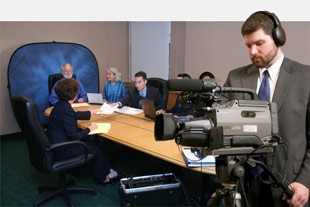Top-Notch Legal Videography for Hearings.
Top-Notch Legal Videography for Hearings.
Blog Article
The Duty of Legal Videography in Depositions and Tests
Lawful videography has emerged as a vital tool in both depositions and trials, giving a multifaceted technique to documenting witness testimonies. As legal experts increasingly recognize its worth, it prompts a deeper exam of just how these aesthetic documents can influence juror understandings and test end results.

Value of Legal Videography
Legal videography plays a pivotal role in the documentation and presentation of depositions and trials. This specialized field incorporates technical skills with legal understanding to develop a dependable record of proceedings that can considerably affect instance outcomes. The visual aspect of legal videography enhances the understanding of witness testimony, permitting jurors and courts to observe not only the spoken words however likewise the disposition, emotions, and body movement of the witnesses.
In addition, lawful videography provides an objective account of occasions, decreasing the potential for misinterpretation that can accompany written records alone. This aesthetic documentation works as a vital tool during test presentations, helping with a clearer and more persuasive narrative for both complainants and accuseds. The capacity to replay video clip sectors throughout court process makes it possible for legal groups to emphasize crucial points, enhancing their arguments efficiently.
The importance of legal videography expands beyond the courtroom; it also plays a vital role in protecting evidence for future reference, whether for allures or additional lawsuit. As such, its combination right into the lawful process is crucial for ensuring a reasonable and precise representation of the truths, inevitably contributing to the quest of justice.

Process of Legal Videography
While catching the nuances of depositions and trials, the process of legal videography includes a number of crucial actions that make certain high-quality, accurate recordings. At first, an expert lawful videographer prepares by reviewing the case materials and recognizing the particular needs of the deposition or trial. This prep work consists of acquainting themselves with the individuals and the context, which helps in capturing essential details.
On the day of the recording, the videographer sets up the necessary tools, which generally includes high-definition electronic cameras, microphones, and appropriate lighting. Guaranteeing optimum angles and sound top quality is critical, as it directly impacts the performance of the recording. The videographer interacts with attorneys and individuals to develop methods, making sure that every person understands the recording process.
During the deposition or trial, the videographer thoroughly tapes the procedures, paying attention to both spoken and non-verbal signs. This consists of catching the temperament and reactions of witnesses and lawyers. After the session wraps up, the videographer may edit the video footage for clarity and compliance with lawful standards, producing a last product that accurately shows the procedures for future referral and usage in lawful contexts.
Benefits in Depositions
The consolidation of videography in depositions provides various advantages that boost the general process of collecting proof. One primary advantage is the ability to catch witness testaments with visual and acoustic fidelity, offering a much more exact depiction of the witness's behavior, tone, and body language. This multidimensional technique enables lawyers and courts to analyze reputation much more efficiently than typical written records alone.
In addition, videographed depositions offer as a powerful device for protecting testament. Should a witness become unavailable for test, their videotaped deposition can be played in court, ensuring that their evidence stays obtainable and relevant. This aspect substantially decreases the risk of losing critical information that could affect case end results.

Finally, videography improves the total professionalism of the deposition procedure, instilling confidence in customers pertaining to the thoroughness of their lawful representation (legal videography). By leveraging technology, legal professionals can dramatically improve the efficiency of depositions
Effect on Tests
In several tests, the assimilation of videography can significantly affect the presentation of evidence and the jury's perception. Lawful videography records witness testaments and essential evidence in a vibrant layout, enabling jurors to involve with the material on multiple degrees. This aesthetic element enhances the narration element of a test, supplying context and psychological vibration that conventional text-based evidence may do not have.
Furthermore, video clip recordings can work as effective devices for impeachment during interrogation. When inconsistencies develop in between a witness's prior declarations and their courtroom testament, video clip proof offers an why not check here unbiased recommendation that can guide jurors' point of views. This immediacy and quality can reinforce the reputation of a celebration's narrative while concurrently undermining opposing disagreements.

Future Trends in Legal Videography
As we look towards the future of lawful videography, several emerging trends promise to improve its role within the courtroom. One considerable pattern is the combination of man-made intelligence (AI) in video clip analysis and editing and enhancing. AI can streamline the procedure of recognizing crucial minutes in tape-recorded depositions, allowing lawyers to quickly access relevant web content, thereby boosting performance in situation prep work.
Additionally, the surge of virtual fact (VIRTUAL REALITY) and enhanced reality (AR) modern technologies is anticipated to change check this just how jurors experience evidence. legal videography. By submersing jurors in a substitute atmosphere, these innovations can provide a much more profound understanding of complicated circumstances, bring about more informed deliberations
Furthermore, the enhancing need for remote depositions, accelerated by the COVID-19 pandemic, will likely proceed. Legal videographers will require to adjust to new software and platforms to make certain high-grade recordings in virtual settings.
Finally, the expanding focus on data protection will certainly necessitate stricter methods for saving and sharing video evidence. As the legal landscape evolves, lawful videographers should remain abreast of these trends to preserve their importance and performance in the judicial process.
Final Thought
In recap, lawful videography offers an important feature in the judicial procedure, boosting the stability of depositions and tests. As technology proceeds to progress, legal videography is poised to further change its function within the lawful landscape.
Report this page